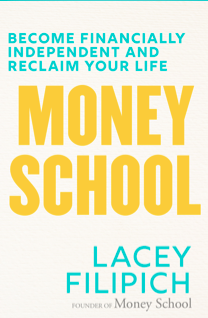Book Review – Money School by Lacey Filipich

Lacey Filipich founded Money School in 2010 to rebuild financial capability in adults and Master Kids Club in 2017 to teach children money skills through enterprise. Thousands of people around the world have used Lacey’s courses to liberate themselves from debt, start saving and get on the path to independence.
I always appreciate reading a book from someone who has gone through the hard yards themselves and has actually reached Financial Independence themselves, as I find it much more engaging if I am reading someone’s own story rather than just the theories on the matter. Not to say that the theories are not educational and useful, but for me personally, I prefer to read it from the perspective of someone who has accomplished it. Preferably someone who has accomplished it recently and in Australia so their strategies used are more relevant, and even more preferable is someone who is roughly the same age, so I feel we share a lot of similar experiences growing up. Well Lacey Filipich ticks all these boxes, so I was really excited to read this book.
I first heard Lacey when she was on the Aussie Firebug Podcast and she provided a quick rundown of her story and I found it interesting mostly because there were a lot of parallels in my own life. We are both around the same age, both studied engineering, both started investing in property before moving onto shares. Immediately I was able to feel a connection to her journey, so I was looking forward to reading her book.
One thing that first hits you reading this book is she does not refer to it as FIRE, instead she calls it FITR (Financially Independent, Time Rich) which I suppose is a more appropriate name, but maybe not quite as catchy. There is a big of a stigma around the idea of being “retired” that you will be sitting around playing lawn bowls and reading the paper all day, when in reality, especially if you retire early, you will most likely be doing some kind of work, whether it be income producing or volunteering. Replacement RE with TR is quite appropriate as it does give a more realistic sense of what you are looking to achieve when you do reach FI.
I definitely got the sense of an engineers and systematic approach to writing this book, it seemed very organised and a good step-by-step guide on how to not only get yourself to FITR but then also your post-FITR life. This approach definitely resonated with me because I do like a logical flow through a book like this.
The bulk of the book is Part 1 – How to Get to FI, and this is pretty much the same throughout any other finance book which talks about reaching FI. It touches on all the different asset classes without going into too significant detail to become cumbersome, but teaches you enough to at least make a start and also to give you some pointers to look into where you can research further. Part 1, while useful, was not the most interesting if you had read other FI related finance books.
Part 2, 3 and 4 however was where I found things to get more interesting from my perspective. I have already posted THIS which was an excerpt from the book which I found of particular interest. Part 3 in particular went into detail about what to do in the event of “negative scenarios” like money stopping coming in and how to deal with things like that while you are on your FI journey. Although it is not relevant to me at the moment, it could be in the future and I definitely appreciated this information as it is not something I have really seen in FI related finance books.
One more thing I definitely appreciated in this book was the anecdotal stories from her own life, or her friends and families. I think just being able to see a real life example of something going through something just makes it more believable and more within the realm of possibilities rather than just seeing data and theories. I will also mention that not all the examples provide with positive financial things she has done in her life, there were plenty of negative examples which is good to see that she is not perfect, but she is owning her mistakes and has been able to recover from them to get to the position where she is now.
Money School resonated particularly well with me as I felt myself and Lacey shared a lot of common experiences while growing up given our ages. Of course there are some unique experiences in both of our lives (and a couple particular traumatic ones which Lacey has had to go through) but being able to see Lacey become financially independent definitely gives me more motivation to continue on my own journey.
I would recommend this book to anyone who was looking to improve their own finances or someone who was already along the FI journey. There is always the risk that the information in the book will become outdated, and as this was only written in 2020 it is still current, I believe it will still be relevant for many years more to come before it might need to be updated somewhat.